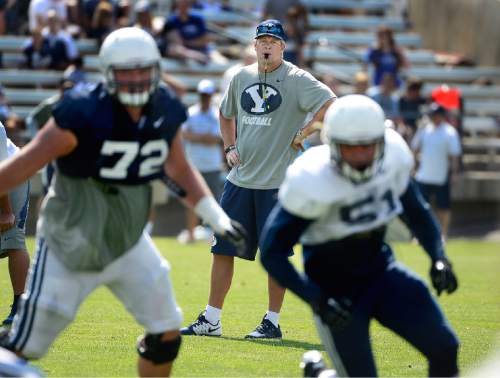This is an archived article that was published on sltrib.com in 2015, and information in the article may be outdated. It is provided only for personal research purposes and may not be reprinted.
The college football season is about to commence, and BYU should be smelling the freshly cut grass, reveling in the wafts of bratwursts on the grill and the slight hints that autumn is on its way and the hope that all its offseason work is about to pay off. It should be fired up by the promise that an unblemished slate stirs. It should be awash in the glory all that renewal brings, just as the engines are revved and the boat is ready to leave the dock.
And it is.
Except for one problem: BYU is dragging anchor. It is preparing for a new start with old baggage.
The brawl at the Miami Beach Bowl was bad enough when it happened. Observers who watched that hemorrhage of sportsmanship either in person or on television were not just put off by it, they were downright disturbed by ridiculous actions — the swinging of helmets, uppercuts, sucker punches, thrown fists with bad intentions — that made the natural violence of the game look like patty-cake.
It was sickening. It was pathetic. And it was public, there for everyone to see.
There was no way to justify it or rationalize it, although some tried, saying the Cougars involved were standing up for their brothers, for their band — or mob — of brothers. It was all Memphis' fault, right? Whatever. Those rationalizations sounded plain stupid in light of what everyone could see with his or her own eyes. Go back and review the film. Positioned against BYU's strict code of behavior, which disallows long hair and beards and sex and consumption of alcohol, the whole deal was exacerbated and made even more embarrassing. In that sorry moment, BYU football players were less messengers from God and more thugs of unrighteousness.
So why rehash that now? Why bring it up at the dawn of a new season?
Because Bronco Mendenhall has not addressed the issue with the millions of people who watched it happen. He said on Monday he would not announce any suspensions put upon the players/perps involved in the fight, would not get specific in any way, until after the Cougars' opening game at Nebraska on Saturday. In fact, he seemed to indicate that those players had already suffered enough.
Let's say it again: Go back and review the film.
It's easy to suppose the players who used their fists as weapons in the postgame, to the horror of those watching, are sorry for what they did, the way they besmirched, and made laughable even, Mendenhall's much ballyhooed notions of honor, spirit, tradition.
Those players are human. They made a mistake that was replayed on highlight shows across the nation. Memphis suspended players, and one Tiger is no longer with the football team. BYU stuffed a sock in its mouth, and kept it there.
The problem with staying silent is the silence has amplified the indiscretions. It has made them worse. It has dragged this process out and spilled over to a new season. It has drawn even more attention to what happened at the bowl game than addressing the misbehavior in timely fashion would have done. We're still wondering who will miss Saturday's opener and who won't. If Mendenhall had announced suspensions in December, it might have caused a few lingering mentions now, but those suspensions would no longer be news.
Now, tangled up in the fresh start at Lincoln, left unaddressed in a public way, they will be news.
When BYU decided to no longer discuss honor code violations, choosing instead to keep those violations private, it was a great move. Most honor code issues are private in nature and properly can and should be handled, at least from an LDS Church standpoint, by an ecclesiastical leader who helps an individual where and how he can and keeps his mouth shut.
That's the way it ought to be. But the Miami Beach Bowl brawl was a public thing. It happened in front of everyone. Treating that as a private matter is naïve and wrong-minded and, as mentioned, makes both the institution and the players who made their mistakes look irresponsible.
The matter could have — should have — been attended to and announced long before now. Instead, when the smells of the freshly cut grass and the brats on the grill and the hope and excitement of a new season should be unfettered, the punishment1, the anticipation of the punishment, drags on like an anchor bouncing outside the boat.
It didn't have to be this way.
And that's on BYU.
GORDON MONSON hosts "The Big Show" with Spence Checketts weekdays from 3-7 p.m. on 97.5 FM and 1280 AM The Zone. Twitter: @GordonMonson.



